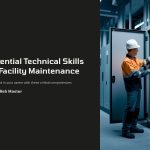
 Facility maintenance requires a blend of mechanical, electrical, and technical expertise to ensure the smooth operation of buildings and equipment. As automation and smart technology become more integrated into facilities, maintenance professionals must continuously upgrade their skill sets. In this article, we’ll explore the crucial technical competencies that every facility maintenance professional should master to stay competitive in the industry.
Facility maintenance requires a blend of mechanical, electrical, and technical expertise to ensure the smooth operation of buildings and equipment. As automation and smart technology become more integrated into facilities, maintenance professionals must continuously upgrade their skill sets. In this article, we’ll explore the crucial technical competencies that every facility maintenance professional should master to stay competitive in the industry.
Mastering Electrical Systems
A deep understanding of electrical systems is fundamental for facility maintenance. Professionals must be proficient in wiring, circuit troubleshooting, and electrical safety to prevent hazards and downtime.
With the rise of automation and smart buildings, knowledge of programmable logic controllers (PLCs) and building management systems (BMS) is becoming increasingly vital. Facility maintenance technicians should be skilled in using diagnostic tools such as multimeters, infrared thermometers, and circuit testers to quickly identify and resolve electrical issues. Regular maintenance checks and adherence to safety codes are key to ensuring system longevity.

HVAC Maintenance and Troubleshooting
Heating, ventilation, and air conditioning (HVAC) systems are essential in any facility, ensuring occupant comfort and operational efficiency. Facility maintenance professionals should have expertise in system diagnostics, refrigerant handling, and energy-efficient optimization.
Regular inspections of HVAC components such as compressors, fans, and air ducts help prevent breakdowns. Technicians must also be aware of environmental regulations regarding refrigerants and air quality standards. The ability to interpret system readings and adjust controls to improve efficiency can significantly reduce energy costs.
Plumbing and Water Systems Management
Facility maintenance professionals must be well-versed in plumbing systems to prevent water leaks, pipe bursts, and drainage issues. A strong grasp of pipe materials, water pressure regulation, and backflow prevention is crucial for ensuring water safety and efficiency.
Technicians should also be skilled in repairing and replacing fixtures, troubleshooting water heater malfunctions, and maintaining sewage and wastewater systems. Understanding local plumbing codes and environmental guidelines is essential for compliance.

Mechanical Equipment Maintenance
A facility maintenance professional should have in-depth knowledge of mechanical systems, including pumps, motors, and conveyor belts. Routine inspections, lubrication, and vibration analysis are necessary to prevent equipment failures and extend service life.
Understanding mechanical blueprints and schematics enables technicians to diagnose issues efficiently. Additionally, proficiency in computerized maintenance management systems (CMMS) helps streamline maintenance schedules and asset tracking.
5imz_ Fire Safety and Emergency Preparedness
Fire prevention is a critical aspect of facility maintenance. Technicians must ensure that fire alarms, sprinklers, and extinguishers are in proper working condition. Regular fire drills and compliance with fire codes are essential for occupant safety.
Facility maintenance professionals should also be trained in emergency response protocols, including evacuation procedures and first-aid response. Keeping up with local fire safety regulations helps prevent potential legal and safety risks.
6imz_ Building Automation and Smart Technology Integration
Modern facilities rely on smart technology to enhance efficiency and security. Building automation systems (BAS) control lighting, HVAC, security cameras, and access control systems.
Maintenance professionals must understand how to operate and troubleshoot these automated systems. Knowledge of network security and data analytics is becoming increasingly relevant as facilities adopt IoT (Internet of Things) solutions.
*Capturing unauthorized images is prohibited*


